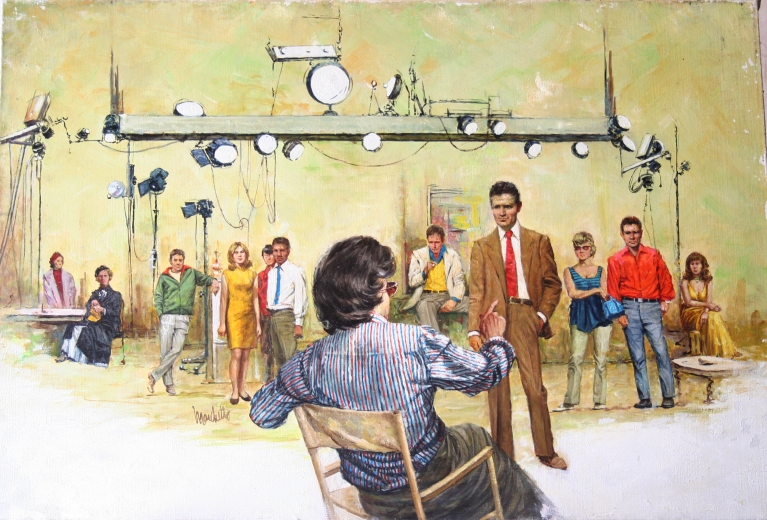Every now and then I stumble upon something that reminds me that our knowledge base and fundamental views about ourselves, others, and the world can be revived and even reinvented simply by a new perspective, a novel idea, or a different set of vocabulary. In one word, the work of a therapist is to inspire a paradigm shift for patients. I repeatedly teach my patients that words carry ‘weight’. There is a certain gravity to the words that we all use, whether in conversation with others or in the constant monologue (often an unhealthy one) running in our own minds. Thus, it follows that it would behoove us to choose our vocabulary well and in a way that serves us towards a desired outcome (e.g., happiness and health).
Over the years of teaching numerous versions of cognitive-behavioral therapy – and for a variety of symptoms, such as anxiety, depression, trauma, and interpersonal difficulties – I have been challenged to be a creative therapist, and to use as many different approaches as I can think of to reach my patients, to help them help themselves in creating change in their lives. I’ve packaged a set of “bucket rules” that are easy to latch onto, and often seem to be the most effective part of my group therapy approaches. Patients learn to focus on what they can control in their lives and to practice basic skills such as effective communication and assertiveness. They are constantly reminded of the value of fostering gratitude in their lives, and not only comparing upward, but also downward, for proper perspective. They are taught to be mindful and compassionate with themselves and others, both skills that once nurtured can lead to great happiness and peace, healthier relationships, and a more balanced life with a true sense of purpose and well-being. Patients learn how to become the most ‘authentic’ self, and to gain self-awareness so that they can adapt and evolve into the very best version of themselves.

The very tools and skills my patients are armed with are also embedded in the way I experience my own day-to-day living. They are no longer abstract ideas memorized in doctoral training as a Clinical Psychologist, but have truly become an integral part of who I am (and it is my hope for all my patients that it will be for them as well). Nonetheless, at times in my life, even I have slipped unknowingly into a state of complacency.
A recent encounter with Saïd Amin, a lifelong friend, successful entrepreneur, and he founder here at Love Expands, not only inspired me on a professional level, but jolted me out of my own state of complacency on a personal level. I met him and his lovely wife for dinner at their favorite downtown Italian restaurant in Seattle. We ordered, and then after catching up on a few personal items, he casually began to share his new perspective on business over some impeccable Italian meatballs and wine. I nearly jumped out of my chair and onto the table with excitement at this novel way he had begun to conceptualize decision-making in his own life.
He said, “The decision to view business relationships through the lens of a casting director has empowered me to make more deliberate decisions vis-à-vis the type of people I want in my life and who fill those roles.”
He paused, and I literally felt the formation of a new neural network in my brain. I stopped him so that I could process this fascinating new perspective. My patients are introduced to this concept of ‘locus of control’ and learn to recognize internal vs. external to ways of viewing life and our roles in it. But for the most part, I keep it clinical, and what I have learned from the field of public health, as well as years of working individually with patients is that knowledge, information, and insight simply does not necessarily translate into behavioral change. After only a few sessions, my patients begin to recognize that some of their thought processes, emotional reactions, and behaviors are not rational, logical, or realistic; at the very least they may not be serving them well. They get it, on an intellectual level. However, there seems to be a quantum leap between intellectual understanding and emotional experience. The role of a therapist is to help patients make that quantum leap.
Saïd continued, “I mean think about it, for a movie to be successful you typically need exceptional casting. Casting directors draw on years of experience during which they have developed a deep knowledge of acting, actors and instincts for identifying the right talent for a given script. They absolutely immerse themselves with the script and the role of each character; it’s as though they are living in the movie. It’s been said that the very best in the industry mix a thorough understanding of the subject matter (script), wisdom from past experiences, and intuitive understanding of psychology. The same deliberate screening process and formula should apply to the business world when we seek to fill a role, whether it be a co-founder to launch a business with, or hiring an employee.”
There was something incredibly accessible about this schema, and in that moment I thought, “Oh my goodness, and this holds true for our personal lives as well!” If only we (myself included) all approached relationship decisions (for friendship and romance) in this way. It is a simple concept that is truly empowering. I know that I am not alone in often feeling that people just somehow come into our lives and we must accept them. After all, there does not appear to be an alternative, right? WRONG!
“There is something incredibly empowering when embracing the responsibility of making life decisions through the lens of a casting director,” he continued.
I began to run through the Rolodex of my own relationships and to examine some of my own difficulties and identify reasons for them. What I began to think about is yet another topic I discuss frequently with my patients, which relates to socialization. And unfortunately, the disadvantages of gender socializations for many cultures or communities, including many places in the United States and abroad. Many women have been socialized to serve others first, which means that the needs of others are always prioritized. Translated into the paradigm of casting, this would mean that the role or part in the movie is given to the person who needs or wants it the most, with less import placed on what the director envisions. This approach, which so many of us have been groomed to take, is in direct opposition to the idea that we are not only capable of, but MUST take responsibility for being the director and for deliberately casting all parts in the movie. And perhaps this is less a gender issue and more a personality one – I have worked with plenty of male patients who are highly others’-focused as well (i.e., the lay term is “givers” vs. “takers,” which I am less fond of using because it implies judgment – something my patients learn to do less of in their lives).
Yes indeed, Saïd, and this is the absolute TRUTH of the situation. People may come in and out of our lives, but it is our responsibility (because it is the one thing we actually have control over – ourselves) to make decisions that serve us well. Will every candidate be appropriate? Probably not even close. And “close enough” does not cut it for successful filmmaking in Hollywood, so why on Earth would we take our own lives any less seriously than a fictitious representation of our lives?

Casting For Life: Five Tips For Becoming A Casting Director For Life
-
- Close your eyes and imagine that your life is a movie. This movie is the story about your life. What roles need to be filled? Which are the protagonists? Examine each role and what type of person would be best suited to fill that role.
-
- Identify past mistakes when ‘casting’ people for business, friendship, or romance. Take ownership for those mistakes and try to uncover what the life lesson was, or what those decisions reveal about you. Carry the lessons, not the luggage.
-
- When casting, be mindful of past blind spots, and old habits that have not served you well. Familiar does not mean healthy, it simply means comfortable, and that may or may not be a benefit to you.
-
- Work on being the best and most authentic version of you. The more self-aware you are, and the more responsibility you take for your own decisions, the more effective you will be in casting.

-
- Don’t forget you’re the director, and no matter how much influence other people may have over you (because you admire, respect, or love them), ultimately, it is YOUR story, not theirs. Focus on your movie…and don’t worry, they all have their own movies to film.



